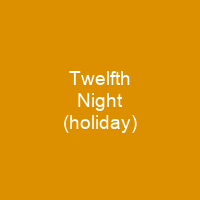Twelfth Night is the last night of the Twelve Days of Christmas, marking the coming of the Epiphany. Different traditions mark the date of Twelfth Night as either 5 January or 6 January, depending on whether the counting begins on Christmas Day or 26 December. Other popular customs include eating King cake, singing Christmas carols, chalking the door, having one’s house blessed and attending church services.
About Twelfth Night (holiday) in brief

In medieval and Tudor England, Candlemas traditionally marked the end of the Christmas season, although later, TwelfthNight came to signal the end. The punch called wassail is consumed especially on Twelfth Day, especially in the UK, and door-to-door was common until the 1950s. Around the world, such special pastries, such as the tortell and king cake, are baked and eaten the following day for the Feast of Epiphany celebrations. The Royal Theatre in London has had a tradition of providing a Twelfth cake since 1795 to provide a king and queen of the night’s festivities, so that those who received the slices should be designated as the kings and queens for the night. It is also a popular tradition to have a bean and pea hidden inside a Twteenth-night cake; the man who finds the bean in his slice of cake becomes King for the day while the lady who finds a pea in her slice of Cake becomes Queen for the evening. In many Western ecclesiastical traditions, Christmas Day is considered the \”First Day of Christmas\” and the Twelve days are 25 December – 5 January, inclusive. If December 26 is the first day, then Tw Twelve Night falls on January 6, the evening of EpChristmas itself.
You want to know more about Twelfth Night (holiday)?
This page is based on the article Twelfth Night (holiday) published in Wikipedia (as of Jan. 10, 2021) and was automatically summarized using artificial intelligence.







